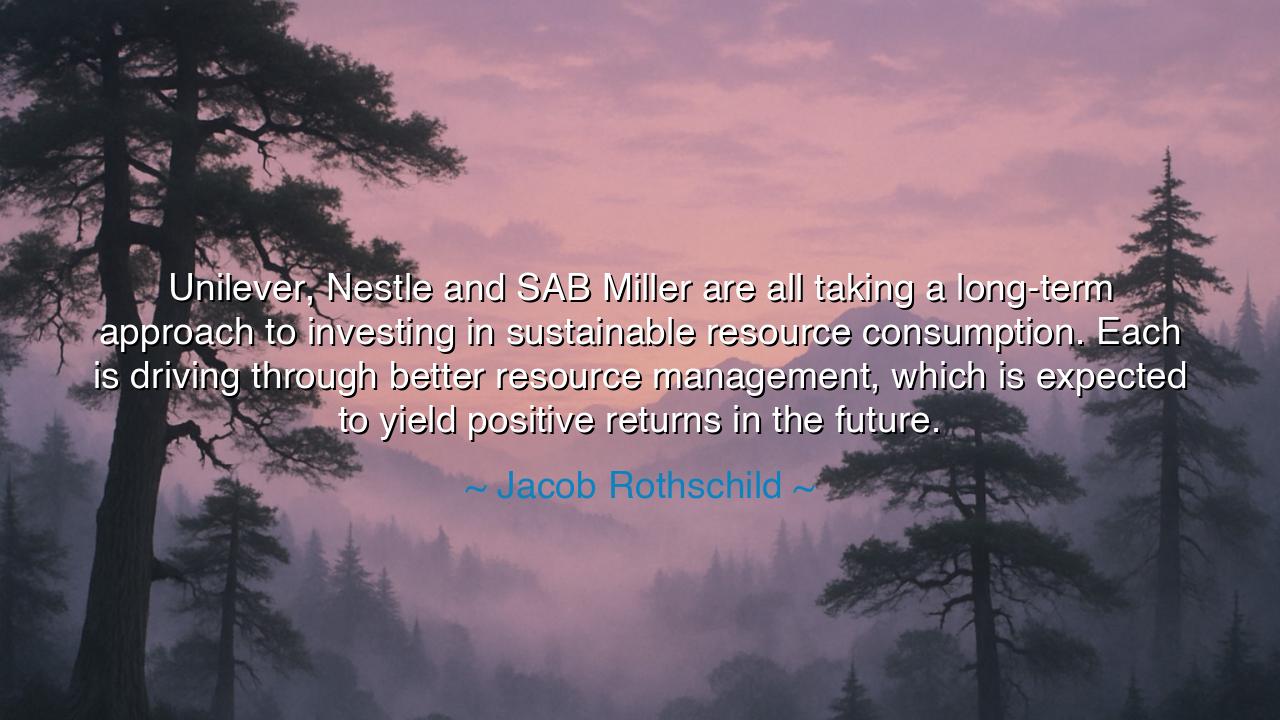
Unilever, Nestle and SAB Miller are all taking a long-term
Unilever, Nestle and SAB Miller are all taking a long-term approach to investing in sustainable resource consumption. Each is driving through better resource management, which is expected to yield positive returns in the future.






When Jacob Rothschild declared, “Unilever, Nestle and SAB Miller are all taking a long-term approach to investing in sustainable resource consumption. Each is driving through better resource management, which is expected to yield positive returns in the future,” he spoke not only of companies and commerce, but of an ancient principle written in the very order of the earth: that to endure, one must live with wisdom, restraint, and foresight. His words remind us that true prosperity is not measured in fleeting gains, but in stewardship of the resources that sustain life itself.
The ancients knew this lesson well. The farmer who hoarded his seed and ate it in hunger had a full belly for a night but famine for the year. The farmer who sowed patiently, nurturing the soil, saw a harvest that fed not only himself but his descendants. In this, Rothschild’s words reflect the wisdom of ages: sustainable resource management is not merely a strategy for corporations, but a sacred law of survival for all peoples.
History offers shining testimony. In the days of ancient Egypt, the Nile was both gift and threat. Pharaohs who managed its floods with foresight — storing grain in times of plenty, conserving water in times of scarcity — gave their people stability for generations. But when leaders neglected this stewardship, famine swept the land, and kingdoms trembled. The same law governs our world today: the wise who invest in sustainability ensure not only their prosperity but the well-being of humanity.
Rothschild’s wisdom also carries a warning. Modern civilization, with its engines and factories, has consumed the earth’s treasures with reckless speed. Forests fall, rivers dry, and climates shift. If corporations, governments, and individuals continue to treat resources as infinite, their empires will crumble, as surely as Rome did when it exhausted its soil and depended too heavily on conquered lands. The long-term approach is not luxury, but necessity — for without it, no return is possible, neither for business nor for humanity.
The heart of the teaching is this: positive returns come not only in profit, but in the preservation of the earth itself. Companies that choose sustainability are not merely securing financial stability; they are aligning with the deeper currents of creation. For the universe rewards balance — waste invites ruin, while stewardship invites abundance. To act otherwise is to fight against the eternal order of life.
The lesson for us is clear. Each of us, whether king or commoner, corporation or individual, must learn the art of stewardship. We must resist the temptation of immediate indulgence and instead plant seeds for the generations yet unborn. This is true in business, in family, in community, and in the environment. To live sustainably is to honor the past and safeguard the future.
In practice, this means managing not only the world’s resources, but our own personal ones: our time, our energy, our wealth, our relationships. Invest them wisely, without waste, and they will return a harvest. Support businesses and leaders who choose sustainability. Conserve what you can, give where you must, and teach others the same. By these actions, you become part of the eternal rhythm of preservation and growth.
Therefore, remember Jacob Rothschild’s wisdom: sustainability is the path to true prosperity. To consume with care, to manage with foresight, to plant seeds of balance — these acts will yield not only profit, but endurance. Live thus, and your name will be remembered not for what you devoured, but for what you preserved, for what you built, and for what you passed on to those who came after you.






VMnguyen van manh
The quote prompts me to consider the role of innovation in sustainability. How are these corporations leveraging technology or research to improve resource management? Are there specific measurable outcomes that show progress, or is it more aspirational? I’d also like to know if stakeholders, including consumers and regulators, are actively influencing these strategies, and whether collaboration across industries is necessary to achieve meaningful long-term environmental impact.
THNguyen Trung Hieu
I feel curious about the balance between economic incentives and ethical responsibility here. Are companies investing in sustainability primarily because it promises future financial returns, or because it’s the right thing to do for the planet? Could reliance on projected positive returns inadvertently limit investment in areas that are crucial for sustainability but less profitable? I’d like to see discussion on how businesses can align ethics, environmental stewardship, and profit effectively.
UGUser Google
Reading this makes me think about global responsibility. While it’s promising that these major corporations are addressing sustainable resource use, what about smaller businesses or emerging markets? Can these practices realistically influence the broader supply chain and global consumption patterns? I’d like a perspective on whether large corporations are setting examples that others can follow or if this is isolated action that won’t scale widely.
GDGold D.dragon
This statement inspires optimism, but I also feel a need for caution. What happens if market pressures force these companies to prioritize short-term profits over sustainability? Are investors equally committed to long-term environmental returns as they are to financial gains? I’d like to understand how such initiatives are being integrated into overall corporate strategy, and whether the long-term approach is truly embedded in company culture.
QTTruong Quang Truong
The quote makes me think about the intersection of profitability and sustainability. Can companies truly achieve positive returns while prioritizing resource conservation, or is it mostly a calculated gamble? I’d love to hear more about specific strategies these corporations are using to improve efficiency and reduce waste. Is this approach scalable across other industries, or are these exceptions due to their size and influence?